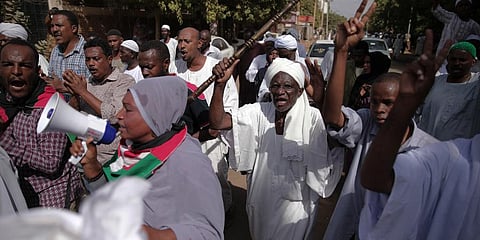

CAIRO: The United Nations and the United States urged Sudan's top generals to show restraint and avoid confrontation as pro-democracy protesters began pouring into the streets Saturday against a military coup earlier this week.
Pro-democracy groups have called for mass protest marches across the country Saturday to press demands for re-instating the deposed transitional government and releasing senior political figures from detention.
The military's takeover has threatened Sudan's fragile Western-backed transition to democracy, which got underway more than two years ago. In 2019, a popular uprising forced the removal of long-time autocrat Omar al-Bashir and his Islamist-allied government after nearly three decades in power.
The U.N. special envoy for Sudan, Volker Perthes, met late Friday with Gen. Mohammed Hamdan Dagalo, a coup leader seen as close to Sudan's strongman, Gen. Abdel-Fattah Burhan.
Dagalo commands the feared Rapid Support Forces, a paramilitary unit that controls the streets of the capital of Khartoum and played a major role in the coup. The RSF is notorious for atrocities and rapes during the conflict in Sudan's Darfur region and for deadly attacks on pro-democracy protesters in 2019.
Perthes said in a message posted on Twitter that he “stressed the need for calm, allowing peaceful protest and avoiding any confrontation” in his talks with Dagalo.
In a separate statement, Perthes said the U.N.'s transition mission “is actively coordinating with mediation efforts currently underway to facilitate an inclusive dialogue, which remains the only path toward a peaceful solution to the current crisis.”
Saturday’s protests were likely to increase pressure on the generals, who already face mounting condemnations from the U.S. and other Western countries to restore a civilian-led government.
The demonstrations, under the banner of “Going backward is impossible,” were called by the Sudanese Professionals’ Association and the so-called Resistance Committees. Both were at the forefront of the uprising against al-Bashir and his Islamist government. They demand the dismantling of the now-ruling military council, led by Burhan, and the handover of the government to civilians.
The list of demands also includes dismantling paramilitary groups and restructuring the military, intelligence and security agencies to remove officers still loyal to al-Bashir.
Protesters took to the streets Saturday afternoon the capital of Khartoum as security forces blocked major roads and bridges linking Khartoum’s neighborhoods. Security was tight downtown and outside the military’s headquarters, the site of a major sit-in camp in the 2019 uprising, according to activist Mohamed Khalifa.
Jeffrey Feltman, the U.S. special envoy to the Horn of Africa, warned against violence toward peaceful protesters in a phone call with Gen. Burhan.
“The Sudanese people must be allowed to protest peacefully this weekend, and the United States will be watching closely,” he said.
Samantha Power, administrator of the U.S. Agency for International Development, also warned about violence against the protesters supporting the democratic transition in Sudan.
“Leaders from around the world, including the US, are making very clear to the military: the Sudanese people must be allowed to protest peacefully,” she said on Twitter.
Since the military takeover, there have been daily street protests. At least nine people have been killed by security forces’ gunfire, according to the Sudan Doctors’ Committee and activists. At least 170 others have been injured, according to the U.N.
Burhan has claimed that the takeover was necessary to prevent a civil war, citing what he said were growing divisions among political groups. However, the takeover came less than a month before he was to have handed the leadership of the Sovereign Council, the main decision-making body in Sudan, to a civilian. Such a step would have lessened the military's grip on the country. The council had both civilian and military members.
As part of the coup, Burhan dismissed the council and the transitional government, led by Prime Minister Abdalla Hamdok, that was in charge of day-to-day affairs. He also imposed a state of emergency across the country and military authorities largely cut off internet and mobile phone services. Internet access remained largely disrupted Saturday, according to internet-access advocacy group NetBlocks.
Burhan installed himself as head of a military council that will rule Sudan until elections in July 2023. In an interview with Russia’s state-owned Sputnik news agency published Friday, Burhan said he would soon name a new premier who will form a Cabinet that is to share leadership of the country with the armed forces.
“We have a patriotic duty to lead the people and help them in the transition period until elections are held,” Burhan said in the interview. He said that as long as expected protests are peaceful, “security forces will not intervene.”
However, observers said it's doubtful the military will allow a full transition to civilian rule, if only to block civilian oversight of the military's large financial holdings.